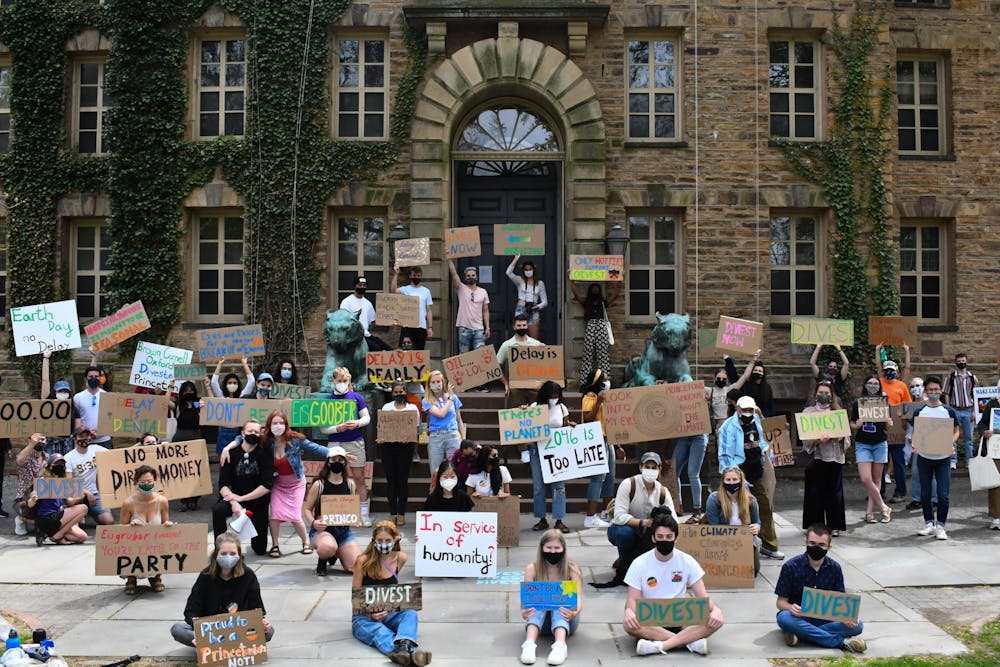The following is a guest contribution and reflects the author’s views alone. For information on how to submit to the Opinion Section, click here.
In 2015, I was part of the campaign that resulted in the entire University of California system divesting from fossil fuels.
So you can imagine my surprise when, upon arriving to Princeton for my graduate degree in climate policy seven years later, I found out the University has not only not divested, but has one of the largest investments of any university endowment in fossil fuels: $1.7 billion invested in fossil fuels, along with $26 million in research funding from the fossil fuels industry over the past five years alone.
In 2022, despite all we know about climate change, Princeton is still stalling. This looks especially bad considering the fact that hundreds of other universities have already committed to divestment, including Harvard, Brown, Columbia, Dartmouth, Rutgers, Georgetown, Boston, Cornell ... the list goes on and on. If the University wants to align its actions with its mission of being “in the service of humanity” and retain its world-class stature, Princeton needs to divest immediately. That means no more fossil fuel investment in the endowment or in research funding.
The University has taken years to reach its latest development: a faculty report recommending criteria for partial dissociation. “Partial dissociation” was first announced in May 2021, after years of student advocacy. However, plans for dissociation only include tar sands, coal, and companies that continue to be involved in climate disinformation. Oil and gas — which account for the vast majority of fossil fuel emissions — are notably missing, as are companies that have been involved in climate disinformation in the past. Instead of a clear timeline or process, President Eisgruber elected to form a new faculty panel, which just released its new report in June 2022 – another step in a lengthy bureaucratic stalling process. Yet even if and when Princeton does finally achieve partial dissociation, it still leaves itself plenty of room for continued investment in companies engaged in the destruction of our planet, and for compromised research funding to shape climate research and policy priorities.
It’s not surprising, perhaps, that some of Princeton’s biggest donors have a significant stake in the fossil fuel industry. Take, for example, the Querrey Simpson Charitable Foundation, which funds the Louis A. Simpson Center for the Study of Macroeconomics and the Louis A. Simpson International Building. The late Louis Simpson himself served on the board of the Princeton Investment Company while concurrently serving as director of Chesapeake Energy, one of the largest fossil fuel companies in the Unites States. Or take the Shelby Cullom Davis Charitable Fund, which, alongside donating millions to Princeton, actively funds the Heritage Foundation, a conservative think tank that downplays climate change. It only makes sense that the University will temper its message on fossil fuels if it wants to continue accepting these donations.
But there’s also another issue here besides the endowment: fossil fuel money that funds climate and energy research at Princeton. Specifically, the Andlinger Center for Energy and the Environment is funded by ExxonMobil and the Carbon Mitigation Initiative is funded by British Petroleum. While some may claim industry-academic partnerships support important climate and energy research, fossil-fuel-funded programs ultimately allow polluting companies to clean up their image (“greenwash”) while continuing to lobby against climate policies and spread misinformation.
Fossil fuel money also threatens academic independence and integrity. Research funded by fossil fuels tends to focus on technologies that keep the fossil fuel industry alive and thriving, such as carbon offsets and carbon capture, instead of the dismantling of Big Oil and rapid deployment of renewables. In fact, it's hard to imagine any scenario in which a funders’ interest would not impact the outcome of research (e.g. Marlboro funding research on tobacco). The research Princeton publishes is instrumental in shaping the narrative around energy and climate. If this information is compromised, we are doing our planet and everyone on it a huge disservice.

Princeton needs to divest its endowment and research funding from fossil fuels fully and immediately if it wants to retain its credibility and live up to its values of public service. Following the lead of over 1500 institutions that have already divested — including universities, pension funds, philanthropies, cities, and even an entire state like Maine — Princeton’s divestment would not only take huge sums of money out of a rotten industry, but could spark momentum elsewhere.
Instead of investing in oil and gas companies and accepting funding from fossil fuel interests, Princeton has the opportunity to be a leader. I implore the University to do more and do better with our money, and everyone who benefits from Princeton’s investments to take action by doing one or more of the following:
(1) signing the open letter to make no donations until divestment, joining the over 3000 Princeton alumni, students, faculty, staff and parents who have signed the second-largest petition in University history;
(2) signing the legal complaint filed with the New Jersey Attorney General in February 2022 to compel Princeton to fully divest; and

(3) for Princeton faculty or staff or emeritus faculty, signing the petition calling for full divestment.
All this, for the future we all deserve.
Claire Kaufman is a first-year MPA graduate student at SPIA studying international climate policy from Los Angeles, Calif. She can be reached at ck6564@princeton.edu.








